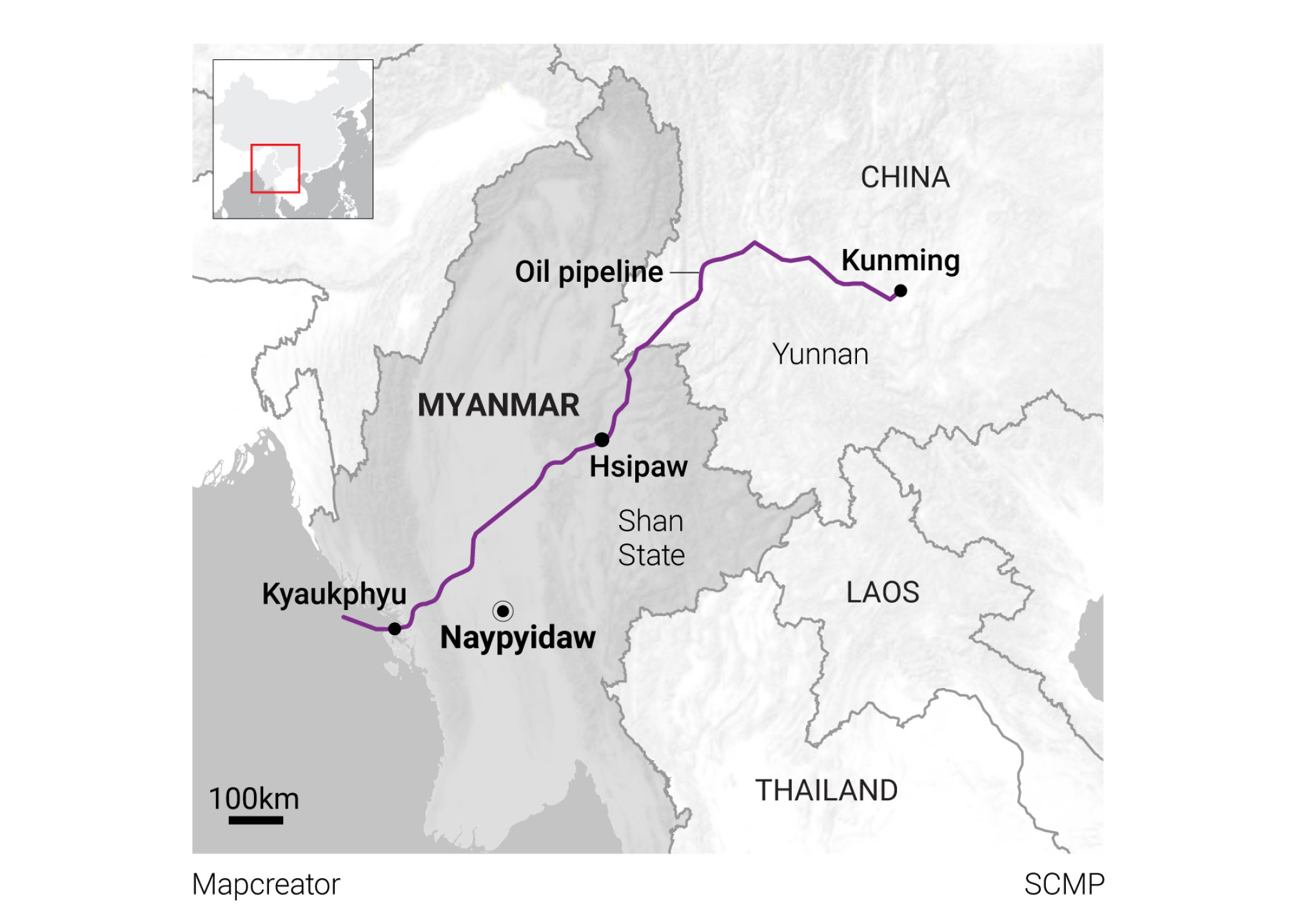
Myanmar army’s landmines at oil, gas pipelines near China ‘likely to backfire’ as coup rebellion grows
- The junta recently planted landmines around key projects in a ‘signal to Beijing it’s serious about protecting the pipelines’ amid rising rebellion against the coup
- But not only would it further antagonise the protesters, the move could also implicate China in the military’s bid to quell the post-coup conflict, an observer says
The Southeast Asian nation is already one of the world’s most heavily mined nations and the use of landmines to protect the nearly 800km pipelines will likely further antagonise residents incensed by the brutality displayed by the junta in recent months, said Myanmar expert Jason Tower.
“The placement of landmines along the pipelines … is very likely to backfire, as this provocative action will harm the interests of local communities, potentially motivating more people to join the growing forces of the People’s Defence Force across the country,” he said, referring to the loose network of militias that have sprouted up nationwide following last February’s coup.
“While the junta’s intention may be to signal to Beijing that it is serious about protecting the pipelines, China must certainly see that such crude and barbaric methods will only increase risk for its strategic energy corridor,” said Tower, the country director for Myanmar in the United States Institute of Peace.

Tower questioned whether the Chinese state firm China National Petroleum Corp, which is the majority owner of the pipeline and receives its oil and gas supplies, was amenable to the use of landmines to protect the facilities.
If it had approved the measure, the firm would be “complicit in the junta’s offensive actions towards local communities, and is likely to further aggravate an already contentious relationship between local communities and the company”, he said.
Reports about the placement of new landmines in Shan State come amid reports of escalatory tactics used by the military to quell the post-coup conflict. In neighbouring Kayah State, airstrikes since mid-December have reportedly displaced at least tens of thousands of people.
Residents near Shan State’s Hsipaw township confirmed reports of the fresh landmines in interviews with This Week in Asia, and said they were fearful of entering the affected forested area which had served as a vital source of wildlife and firewood.
The landmines have been placed near a pumping station for the pipelines that is just outside the Nawng Arng village and some 15km west of Hsipaw – the key town of Shan State.
The Shan Human Rights Foundation, a rights group, had on January 18 indicated that a village headman was notified about the landmines by an army sergeant about two months ago, with a warning that villagers should avoid the area.
‘The emperor has no clothes’: Myanmar’s junta still fighting for legitimacy
The nearly 800km dual pipelines came into focus early on following last February’s coup, with sources saying Chinese officials had on more than one occasion contacted the Tatmadaw – as the Myanmar military is known – to call for beefed-up security for the projects.
The gas pipeline carries gas from the country’s offshore fields, while the parallel oil pipeline delivers mainly Middle Eastern crude from a 300,000-tonne terminal in Made Island near northwestern Rakhine State to a refinery in Yunnan’s capital, Kunming.
One villager, who asked for his name to be withheld, said it was hard to gauge just how many land mines had been laid.
He said military officials had told the villagers that the land mines were placed for “security reasons” and did not indicate when they would be removed.

An immediate concern for the villagers is the avoidance of being caught up in any attack – or government counter-offensive – linked to the pipelines, which in peacetime transported some 22 million tonnes of oil and 12 billion cubic metres of natural gas to China annually.
The gas pipeline began operations in 2013, while the oil crude pipeline began running in 2017, after the now-ousted National League for Democracy (NLD) government came to power.
In private discussions with the junta last year, Chinese officials repeatedly voiced concerns about the security of the pipelines and that in part precipitated stepped up measures to guard facilities along the project, sources with knowledge of the matter said.
With the junta distracted, Myanmar’s Arakan rebels cement control
In a sign that Beijing’s anxieties remain unabated by the junta’s tightened security measures, it has reportedly called on the anti-junta shadow administration – the National Unity Government (NUG) – to ensure resistance fighters did not attack Chinese assets in the country.
In an interview this week with The Irrawaddy, the NUG’s defence minister, Yee Mon, said he told Chinese embassy officials that incidents such as a recent attack on a nickel processing plant would not be repeated.





